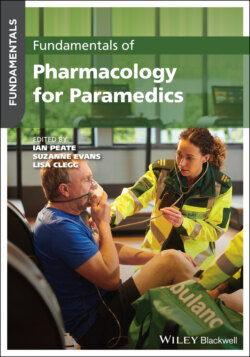Читать книгу Fundamentals of Pharmacology for Paramedics - Группа авторов - Страница 22
Skills in practice
ОглавлениеThe decision about whether to administer or withhold a medication requires a process of clinical reasoning, based on your assessment of the patient, their medical and medication history and the indications and contraindications of the medication.
An indication for a medication is a particular symptom or sign reported or displayed by a patient. An indication should not be confused with a definitive diagnosis. In paramedicine, a primary assessment and history taking should be carried out if possible, prior to establishing an indication. Administering an indicated medication should only occur if the potential benefit of the medication is judged to outweigh the risk to the patient, such as in the following examples:
An unconscious child who is hypoglycaemic is indicated for glucose 10% administration. The signs used here as indications for the medication are both the finding of hypoglycaemia and the child’s level of consciousness.
A 50‐year‐old male patient who is experiencing crushing left‐sided chest pain has an indication for aspirin administration, provided you have established that he has no abnormal bleeding tendencies.
Sometimes, despite there being an indication for a medication, you will not be able to administer it because of a contraindication. A contraindication is a reason to withhold medication because it might cause harm to the patient, as in the following examples:
Aspirin is contraindicated for analgesia and fever in paediatric patients who are under 16 years of age because of the risk of Reye’s syndrome. The syndrome is quite rare and only occurs in children, but is very serious.
Ipratropium, a bronchodilator commonly used with salbutamol for the treatment of bronchospasm, is usually contraindicated in patients who have glaucoma, as a known side‐effect is an increase in intraocular pressure.
Amiodarone is an antiarrhythmic indicated for tachyarrhythmias (cardiac arrhythmias which involve an increased heart rate), but contraindicated in torsades de pointes, a potentially fatal tachyarrhythmia which can result from long QT syndrome, because amiodarone will result in further protraction of the QT interval.
As data about medications are gathered, indications and contraindications may change, so it is important to remain abreast of these changes in your practice as a paramedic.
